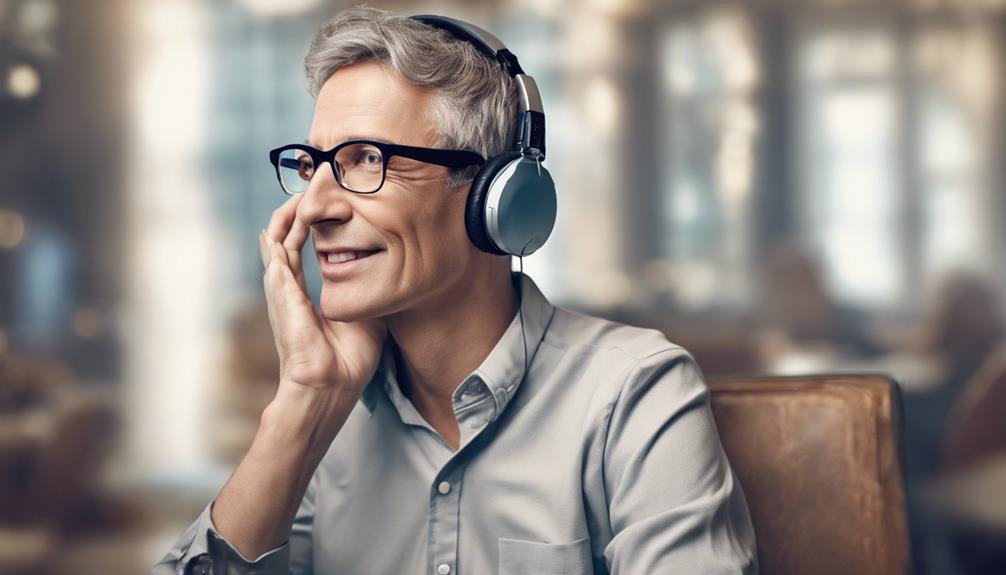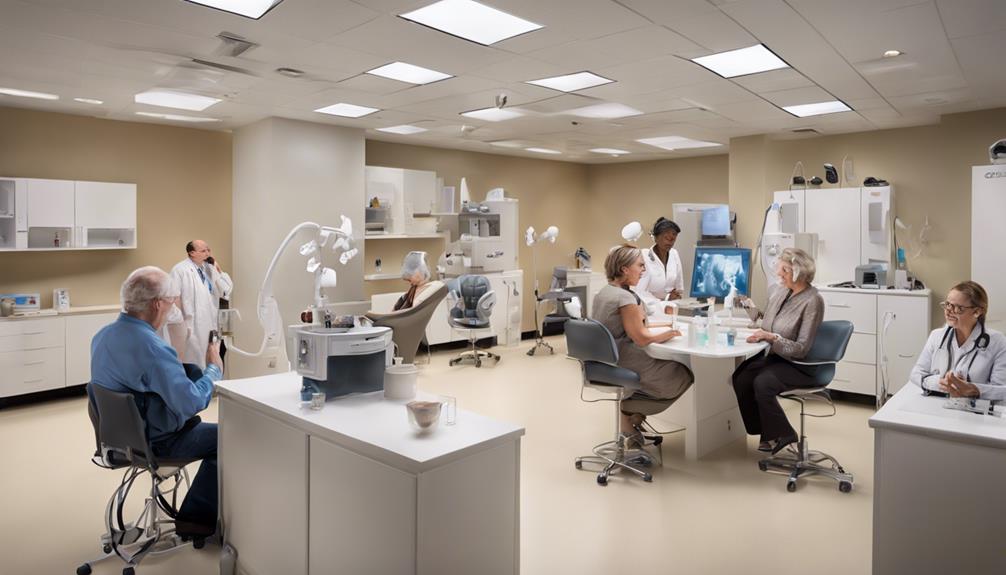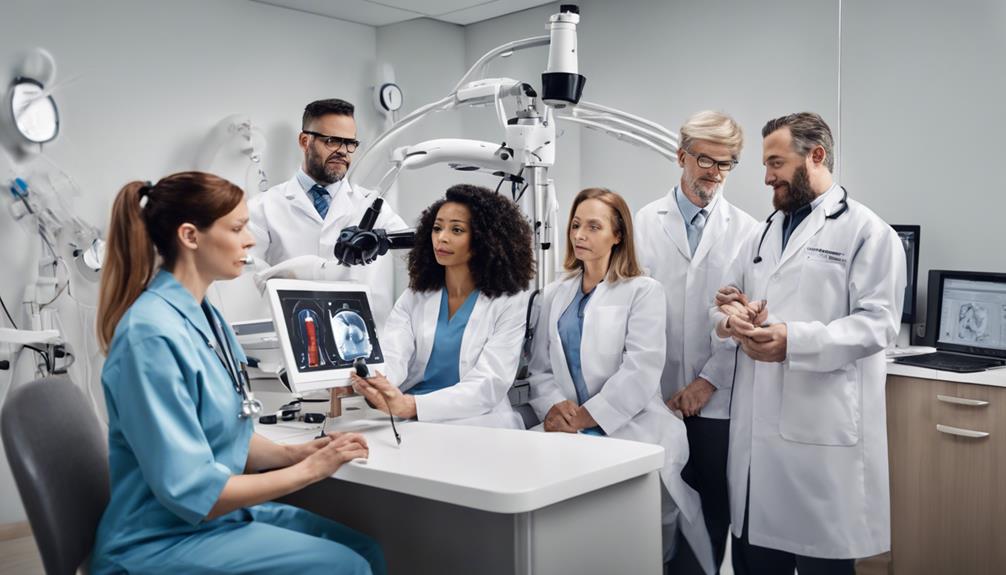Imagine glasses that not only enhance your sight but also enhance your ability to hear, enabling you to accurately perceive the sounds around you.
The integration of hearing aids into glasses opens up a realm of possibilities for those in need of both visual and auditory assistance.
From discreet technology to improved sound clarity, these glasses offer a promising solution for individuals looking to enhance their hearing experiences.
Discover how this innovative combination could reshape the way we perceive the world and engage with our surroundings.
Key Takeaways
- Glasses with hearing aids enhance sound clarity in noisy environments.
- Technology integration in smart glasses benefits individuals with hearing impairments.
- Enhanced clarity and precision achieved through directional microphones and acoustic technology.
- Impact of glasses with hearing aids: improved focus, communication, and sound perception.
Benefits of Glasses With Hearing Aids
In noisy environments, glasses with hearing aids significantly enhance our hearing capabilities, enabling better focus during conversations. The benefits of incorporating hearing aids into glasses are vast. Individuals, even those with normal hearing, can experience improved sound clarity and reduced distractions, leading to more effective communication.
One key advantage is the innovative feedback suppression feature, which addresses issues such as hearing one's own voice too loudly or encountering unwanted noise interference. This not only enhances comfort but also ensures a seamless auditory experience.
EssilorLuxottica's visionary approach to combining glasses with hearing aids emphasizes not only technological advancements but also considerations of comfort, cost-effectiveness, and visibility. The clarity and precision offered by these integrated devices showcase a promising future for those seeking improved hearing capabilities without compromising on style or convenience.
Technology Integration in Smart Glasses

Integrating cutting-edge technologies such as augmented reality displays and sensors, smart glasses revolutionize user experiences across diverse industries, offering hands-free communication, navigation assistance, and real-time information display capabilities.
By seamlessly integrating hearing aids with glasses, these devices cater to individuals with hearing impairments, enhancing their overall sensory experience. The technology integration in smart glasses allows for a more inclusive user experience, providing real-time data and seamless connectivity for individuals in various settings.
With advanced technologies embedded within smart glasses, users can benefit from enhanced communication, improved navigation support, and instant access to critical information. Companies like Google, Microsoft, and Vuzix are at the forefront of developing these innovative solutions, aiming to improve productivity and efficiency across different sectors.
The ability to combine hearing aids with smart glasses showcases a commitment to accessibility and user-centric design, making these devices indispensable tools for individuals seeking enhanced clarity and precision in their daily activities.
Enhanced Clarity and Precision
Enhancing sound perception and focus, hearing aid glasses utilize directional microphones and proprietary acoustic beamforming technology to provide superior clarity and precision in auditory experiences.
The directional microphones embedded in the glasses enhance the ability to focus on conversations by reducing background noise and amplifying the desired sound. This feature is particularly beneficial in noisy environments, where the glasses' real-time audio processing capabilities come into play.
The acoustic beamforming technology employed ensures that sound is captured and directed towards the ear canal, delivering natural sound and improved clarity to the wearer. By prioritizing precision in sound perception, these glasses offer an advanced solution for individuals seeking enhanced auditory experiences.
Whether in crowded spaces or quieter settings, the enhanced sound quality provided by these glasses can significantly improve the overall quality of life for those with hearing impairments.
Impact on Hearing Impairments

Utilizing advanced directional microphones and acoustic beamforming technology, glasses with hearing aids significantly impact individuals with hearing impairments by enhancing sound perception and clarity in various auditory environments. Wearing RIC Hearing Aids embedded within glasses can help people with hearing loss in the following ways:
- Improved Focus: New Hearing Aid Glasses can assist individuals by isolating voices and reducing background noise, enhancing their ability to concentrate on specific sounds even in noisy settings.
- Enhanced Communication: The advanced hearing technology in these glasses helps individuals struggling in challenging auditory environments to better understand speech and communicate effectively.
- Natural Sound: The open-ear design of hearing aid glasses offers a natural sound experience, making it easier for users to discern sounds and enjoy clear audio without feeling isolated.
The benefits of RIC (Receiver-in-Canal) type hearing aids, integrated into glasses, extend beyond mere amplification, providing individuals with a more immersive and inclusive auditory experience.
Changing Lives Through Innovation
Our exploration of the innovative impact of hearing aid glasses on individuals with hearing impairments delves into the transformative advancements revolutionizing auditory experiences. The integration of directional hearing technology within these glasses offers remarkable benefits, particularly in noisy environments where social interactions can be challenging. Nuance Hearing's cutting-edge beamforming technology, with a direction coefficient of 15 decibels, provides enhanced focus during conversations, significantly improving the overall quality of sound perception. Prototype testing conducted at Milan's Experience Center has shown promising results in addressing various hearing challenges faced by individuals. EssilorLuxottica's visionary approach to hearing aid glasses not only caters to those with existing impairments but also presents potential advantages for individuals with normal hearing seeking innovative solutions. The combination of advanced technology and design in these glasses signifies a significant leap forward in the quest to enhance auditory experiences for all.
| Hearing Aid Glasses | Directional Hearing Technology | Nuance Hearing's Beamforming Tech |
|---|---|---|
| Enhances hearing in noisy environments | Improves focus on conversations | Direction coefficient of 15 dB |
| Prototype testing successful at Milan's Center | Addresses various hearing challenges | Potential benefits for those with normal hearing |
Frequently Asked Questions
Can You Get Glasses With Hearing Aids Attached?
Yes, you can get glasses with hearing aids attached. These innovative devices combine the functionality of both hearing aids and prescription eyewear in one convenient product.
They offer a seamless solution for individuals needing both hearing assistance and vision correction. The integration of hearing aids into glasses provides discreet and streamlined support for managing hearing loss and visual impairments.
This technology enhances user comfort by eliminating the need for separate devices.
Are There Glasses With Built in Hearing Aids?
Yes, there are glasses with built-in hearing aids available. These innovative devices merge vision correction with hearing assistance to aid individuals with mild to moderate hearing loss.
How Do You Wear Glasses and Hearing Aids Together?
When wearing glasses and hearing aids together, we position the glasses before inserting the hearing aid to prevent discomfort.
Opt for glasses with thin wire temples for more room behind the ear. Smooth motions when putting on or removing glasses help avoid displacing the hearing aid.
Excessive tilting of glasses can affect the hearing aid's position. With practice, wearing glasses with hearing aids will become more comfortable and seamless.
Can You Wear Glasses With Bose Hearing Aids?
Yes, we can wear glasses with Bose hearing aids.
The advanced Bose hearing aids are designed to seamlessly integrate with various glasses styles, ensuring comfort and functionality.
The slim and discreet design of Bose hearing aids minimizes interference with glasses frames, allowing users to wear both simultaneously without discomfort.
Bose prioritizes user comfort and ease of use in their technology, making their hearing aids optimal for glasses wearers seeking a seamless experience.
Conclusion
In conclusion, glasses with hearing aids offer a groundbreaking solution for individuals with hearing impairments. The integration of advanced technology in these smart glasses provides enhanced clarity and precision in sound delivery.
This innovative product has the potential to change lives by improving hearing experiences in various environments. With the power of innovation and integration, glasses with hearing aids pave the path towards a more accessible and inclusive future for all.









